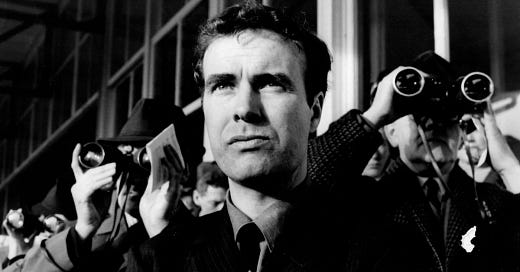An ode to sports writing
The beauty of the written word has never been under more threat from people who don't understand its power - it deserves to be saved from the AI slop-off
Many years ago I was in my uncle’s garage on Christmas Day, browsing through the books he had amassed over the years. Among the collection was a veritable who’s who of sports journalism from the previous decades.
He told me to take whatever I liked, and my eyes were immediately drawn to one item in particular: Hugh McIlvanney on Boxing.
This isn’t the place to explain the impact McIlvanney had on sports writing in general, or how he applied the type of respect and majesty to a sport where two men (it was almost exclusively men, then) batter each other relentlessly. But he, and others, were able to elevate a brutal event into the sport of champions.
The book itself seems like an impossibility. Writing this good feels like it should be about geopolitics, or history, or a more formidable topic. But boxing has devolved to such a degree where, if you read McIlvanney’s 2002 tome now, it feels like he’s referencing an alternative reality.
The way he articulates decades of boxing history - with special focus on Muhammad Ali - builds an iconic, halcyon era. It’s thrilling, shocking, poignant, and just really fucking good. McIlvanney is an icon for a reason. He made it seem special, maybe more special than it had any right to be.
What he would think of the sport now would be box office in its own right. But there’s two things good sports writing can, and should, do, and why it’s important that in the era of streams and watch alongs, of AI news and shock jocks, that some adults in the room are still able to document our reality in a way that doesn’t require an algorithm to be gamed in order for it to resonate.
Firstly, there’s the pure concept of good writing. These days it’s worth considering whether the general public even know what it is, especially when the only books most people read are ghost-written by authors working on behalf of celebrities. But when you see it, words put together in a beautiful order, you never forget it. It doesn’t have to be flowery or verbose. It just has to serve the purpose of the second thing it can do - spark imagination.
Incessant phone usage and the enduring creep of AI means people’s ability to utilise the pictures in their mind has never been at a bigger state of crisis. The rise of radio and television in the 20th century were both depicted as killers of writing, but it survived because not everything could be seen or heard.
However, phones now document every single step of the human existence and so people don’t need to imagine anything - it’s pushed directly into their feeds, virtually in real time. And don’t worry, if it isn’t, here’s another AI tool which will emulate it for you anyway.
The capacity to form a picture of something is apparently too much like hard work these days, and yet, when revisiting McIlvanney’s book I’m struck by how enjoyable it is to have never seen what he’s referencing, and to simply imagine being there. That is what all sports writing should do, and the very best remains a complete joy.
Sports writing as a valuable niche
Some published fanzines and quarterlies such as the Blizzard and Nutmeg continue to do fantastic work, but the audience being attracted to buying items like that remains niche, at best. Elite sports writing always used to be part of the storytelling itself, so where does it find itself now?
Former Herald and Times journalist Graham Spiers took to Twitter just after Christmas to comment that his ‘match report’ published directly to the same platform had received 110,000 views, and questioned why sports writers need masthead publications any more.
He simultaneously could not be more right and more wrong. Twitter ‘views’ include literally anyone who scrolled past Spiers’ tweet in their feed, let along how many actually expanded to read it. The answer to that would depress him way, way too much.
But he does make a point. Modern revenue generation techniques, including programmatic advertising and subscriptions, make native digital content very difficult to ingest at the time investment required to genuinely enjoy what good sports writing is on a mobile or desktop screen.
And the few publications that still have full-time sports correspondents, such as the Athletic, are focused on news reporting packaged as long-reads, not necessarily to champion coverage of events from a unique perspective.
So where do the writers go? Well, that’s where Spiers is probably right. There’s no return to exorbitant writer salaries in traditional media organisations - that’s gone. Is it Substack? It’s certainly enjoying a good moment, but it’s not as good at archiving content as it perhaps should be.
We have to retain sports writing in its purest form digitally. The gatekeepers of the internet have already begun purging old sites and deleting the archives, all to free up space on their servers for the incoming AI tsunami of sub-standard, unwanted, redundant mimicry of the real thing.
It’s more important than ever that we find a good home for it. Where that is? Your guess is as good as mine. But I hope we can find it.
More damn good writing:






Couldn’t agree more
Excellent piece, Paul.